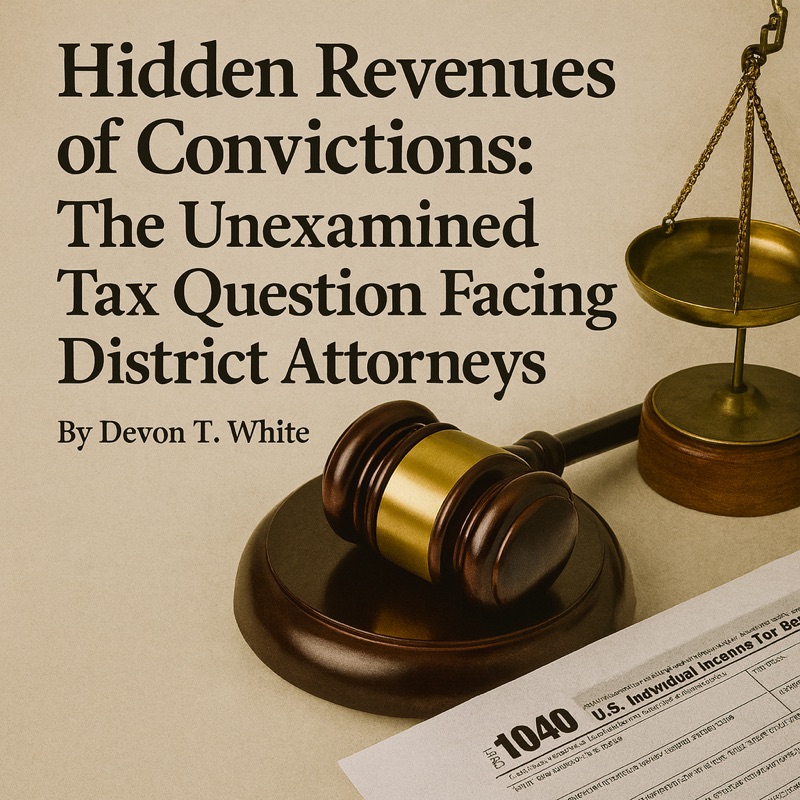
Hidden Revenues of Convictions: The Unexamined Tax Question Facing District Attorneys
By Devon T. White
Los Angeles, CA — A growing number of voices are raising concerns about a largely overlooked issue in America’s justice system: the potential financial gains prosecutors may receive from convictions, and whether those gains are being properly reported to the Internal Revenue Service (IRS).
At the heart of this claim is a little-known financial process. Every criminal case, once filed, is effectively bonded using the defendant’s Social Security number—entered without dashes—as an exemption number. This mechanism allows courts to treat cases as financial instruments, with credits and discharges moving quietly behind the scenes.
“The case is already discharged on paper,” says one prisoner-rights advocate who has studied the issue. “But when the courts fail to close the account on their books, it creates the illusion that a debt remains. That illusion keeps people in custody.”
The Unfinished Accounting of Convictions
Court cases, much like financial accounts, have opening and closing balances. The charge itself becomes a liability; the bond, an asset. In theory, when the bond is executed, the account should be closed. But insiders claim that many courts never finish this final step, leaving “open accounts” on their books.
The result? Defendants may serve sentences under judgments that are, from an accounting perspective, already satisfied.
The IRS Angle
This is where the issue enters dangerous legal territory for prosecutors. If convictions create measurable financial value—a type of credit or income—then district attorneys may be required under federal tax law to report those gains on IRS Form 1040.
So far, however, there is little evidence of this happening. Prosecutors traditionally declare only their annual salary as income. The financial yield of convictions, if it exists as described, rarely appears in public filings.
“The last thing any district attorney wants is the IRS examining their conviction records for the last seven years,” says a former defense paralegal familiar with court financial practices. “Because if they are profiting from each case without reporting it, that’s unreported income. And unreported income is taxable.”
Implications for Public Trust
The possibility that convictions generate unreported financial gain has far-reaching implications. It challenges public trust in the justice system and raises serious questions:
- Are defendants imprisoned because of law, or because of unresolved financial accounts?
- If district attorneys profit from each conviction, does that create a conflict of interest?
- Should the IRS and oversight agencies investigate these practices?
For taxpayers, the issue is more than theoretical. If public officials are reaping unreported financial benefits, the public not only loses transparency but also faces the burden of lost tax revenue.
Calls for Scrutiny
Legal scholars note that while much of this process remains shrouded in bureaucratic accounting, the principle is clear: any financial gain, no matter how unconventional, is subject to IRS oversight. “Income is income,” one tax attorney explained. “If there’s profit tied to convictions, it must be reported. If it’s not, that’s a federal problem.”
Advocates are now calling for independent audits of court accounting practices, as well as IRS review of conviction-linked revenues. Until such reviews take place, the justice system continues to operate in the shadows of financial ambiguity.
Conclusion
Convictions should serve justice, not function as hidden revenue streams. Yet without transparency, the public cannot know whether district attorneys are properly reporting all income connected to their work.
If the financial mechanics behind convictions truly generate taxable gains, then silence and inaction not only undermine justice—they may also represent a tax evasion scheme hiding in plain sight.


Comments
Post a Comment